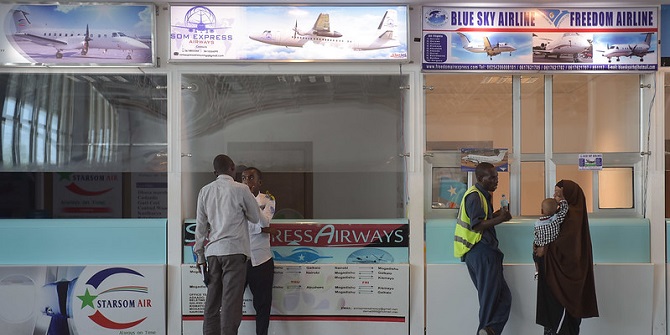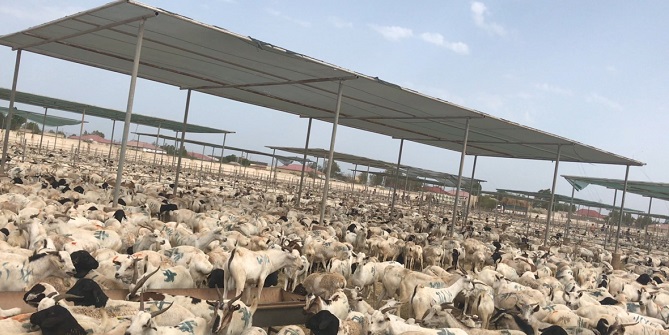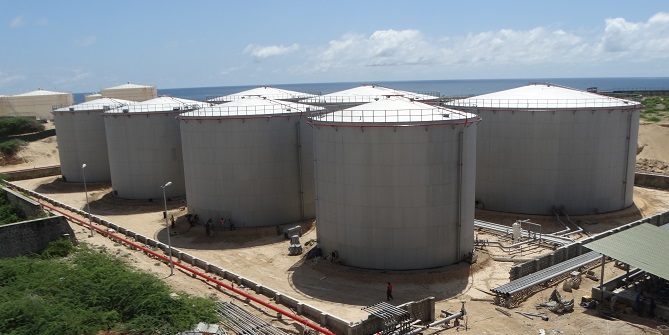
The economic impact of the Somali diaspora on Somalia, specifically those based in North American and Europe, has been amply documented. The biggest economic influence comes in the form of remittances that make up a large share of the country’s economy. The potential and real economic impact of COVID-19 in various Somali regions has also been addressed by several recent blogs: in Puntland and Somaliland. In this blog I want to address how the economic impact of COVID-19 is affecting the state-building project in the country by undermining one of the key features of this project: domestic revenue generation of the Federal Government of Somalia. The blog focuses on Mogadishu and the Federal Government whose reach, including ability to raise revenue, is largely limited to Mogadishu.
The Federal Government of Somalia relies overwhelmingly on donor support to help it pay for its civil servants and the meager social services it provides. With capacity building support from donor countries and a desire to gain a modicum of financial independence it has been trying to increase the domestic share of its revenue. Several factors, however, severely limit its ability to increase domestic revenue. These include, the limitation of the FGS’s reach into Mogadishu, lack of clarity on revenue sharing between the federal government and federal member states, inefficiency and corruption within the FGS, and lack of legitimacy which hampers the willingness of the population to pay taxes to the government.i Despite these shortcomings the government has been making slow progress in increasing the domestic share of its budget. In what follows I highlight several arenas of economic activity where the government has been able to generate income but which have now been disrupted by COVID-19.
Remittances
A major impact of the pandemic has been on the money those in the diaspora send to support relatives and friends in Somalia. It is estimated that the Somali diaspora sends US 1.5-2 billion dollars to Somalia annually. These remittances constitute 25-40 percent of the country’s economy. Most of this money comes from the Somali diaspora based in Europe and North America. Since Somalia does not have a banking system that is linked to international institutions, Somalis have to rely on hawalas,ii Money Transfer Operators (MTOs) whose original business model and success was based on trust and lineage based identification.iii Somali MTOs are capable of wiring money to almost everywhere in Somalia, and are expanding their operations to neighbouring countries especially those that have large Somali populations. MTOs used to use regular banks to wire money to Africa before collecting and distributing it to their various branches. This all changed after the September 11, 2001 attacks in the U.S. and the subsequent Global War on Terror (GWOT). Due to fears and allegations that some of the money sent through MTOs was used to support terrorist organisations like al-Shabaab almost all the banks refused to do business with them and closed their accounts. The banks wanted to avoid the scrutiny that would come from doing business with MTOs. As a result, Somali MTOs could no longer wire money to Africa. In response they began sending carriers with cash in suitcases to deliver the money to Dubai from where it was dispersed to different parts of Africa. Since 2010 this is how the Somali diaspora sent remittances to Somalia. But with the stoppage of international air travel due to COVID-19 the diaspora’s ability to send remittances back home has been severely curtailed since March 2020.iv Remittances have fallen as much as 50% in April and May.v Though things have changed recently with the easing of international travel, the UN still estimates a 17% percent drop in remittances for 2020.vi This has had a huge impact on the local economy and by extension the government’s ability to generate revenue through taxation. For instance, estimates are that private consumption expenditure has gone down by as much as 25%.vii To lessen the economic pain the FGS has stopped taxing medical services, medicine, and food purchases.viii
Adan Adde International Airport
According to interviews with members of the government, Mogadishu’s main airport, Adan Adde International Airport, is, along with the port of Mogadishu, one of the biggest source of domestic revenue for the government. Turkish owned FAVORI LLC Airport Management and Ground Handling Company has managed the airport since 2013. In handing management over to the company the government argued that this was necessary to enhance the security and image of Somalia’s main airport and to ensure a more efficient running of it so as to increase the government’s share of the money from this source. FAVORI LLC thus took over the management of everything at the airport from security to maintenance and agreed to split the profits with the FGS. With the restrictions of international travel – Somalia imposed a ban on international flights in April – the money that flowed into government coffers from the airport has decreased dramatically. Another consequence of the reduction of relatively well-off visitors to Mogadishu has been the drying up of business at hotels and restaurants, another area where the federal government manages to collect taxes.
Hotels and restaurants
The presence of international visitors in Mogadishu, mostly from the Somali diaspora, that came with the onset of the state-building process gave rise to another economic activity that is also taxed by the federal government: securitised hotels and restaurants. Since the onset of this project around 2012, heavily securitised hotels that cater primarily to the diaspora and other well connected business people and politicians have popped up throughout the city. These hotels have restaurants and cafes within them that are very expensive in comparison to local establishments. Though not always successful, the government has nevertheless been able to collect taxes from these establishments relative to other areas of economic activity in the city. The stoppage of international travel to Mogadishu due to COVID-19 has limited the amount of business these hotels and restaurants have had and by extension the government’s tax base. One might reasonably argue that whatever business activity the diaspora presence in Mogadishu normally generated will be unaffected by COVID-19 because as many diaspora are prevented from coming to the city and an equal number are prevented from leaving thereby keeping these hotel businesses afloat. Such an argument, however, would be inaccurate in that it misses a key feature of the Somali diaspora’s relationship with Somalia. The Somali diaspora’s relationship with Somalia swings back and forth between hope and despair and leads to constant movement in and out of the city. There is usually hope around every election cycle and with that hope they come to the city mostly in search of opportunities in government, the NGO world, and in business ventures. People come to Mogadishu having saved enough funds to cover their expenses while they explore opportunities. A small minority might secure jobs or start successful businesses but more often than not the hope turns into despair for the majority as they exhaust their funds and are forced to return to their adopted countries. This reality means that the diaspora that have been restricted to Mogadishu due to COVID-19 do not have the same spending power as when they first arrived and might themselves be in precarious situations. Consequently, the various businesses such as hotels and restaurants that relied on diaspora presence and spending in the city have taken a hit since the onset of COVID-19 as has the portion of the federal government’s revenue that was generated through taxation of these businesses.
Conclusion
It has been said that Somalia is one of the least prepared countries to tackle the spread of COVID-19. There are almost no facilities to house and track those that come down with the disease let alone trace and track in order to control its spread. Less commented on, however, is how this global pandemic might affect the fragile state-building project in the country. There are clearly many interpretations of what state-building actually means in the Somalia context, as well as the extent to which it is actually taking place. That said, one of the key requirements in establishing a stable and self-sustaining state in Somalia is to enable it to become financially less reliant on international donors by expanding its domestic revenue sources. Over the past several years the FGS has attempted to accomplish this with limited but not insignificant successes, and the diaspora is a part of this in many different ways, some of which have been indicated here. The economic impact of COVID-19 threatens to undermine various sectors of the economy that are crucial for government revenue collection thus putting further strain on the state-building project in Somalia.
[i] Sagal Abshir, Khalif Abdirahman, and Hannah Stogdon, “Tax and the State in Somalia: Understanding domestic revenue mobilization,” Rift Valley Institute (May 2020).
[ii] Some hawala operators prefer to be referred to as Money Transfer Operators (MTOs) because of the possible negative connotations hawalas have in Western media. Among Somalis they continue to be referred as hawalas.
[iii] As a result of pressure from governments to track the flow of money hawalas are now compelled to identify senders and recipients through government issued identity documents.
[iv] While some MTOs have shifted to online platforms, the utilisation of online platforms is still very limited, particularly as it relates to transfers from Europe and North America to Somalia.
[v] “The Economic Impact of COVID 19,” FGS COVID 19 Technical Committee (June 2020).
[vi] “Situation in Somalia: Report of the Secretary General,” United Nations Security Council (August 2020).
[vii] “The Economic Impact of COVID 19,” FGS COVID 19 Technical Committee (June 2020).
[viii] Based on interviews with contacts in Mogadishu.
Note: The CRP blogs gives the views of the author, not the position of the Conflict Research Programme, the London School of Economics and Political Science, or the UK Government.





